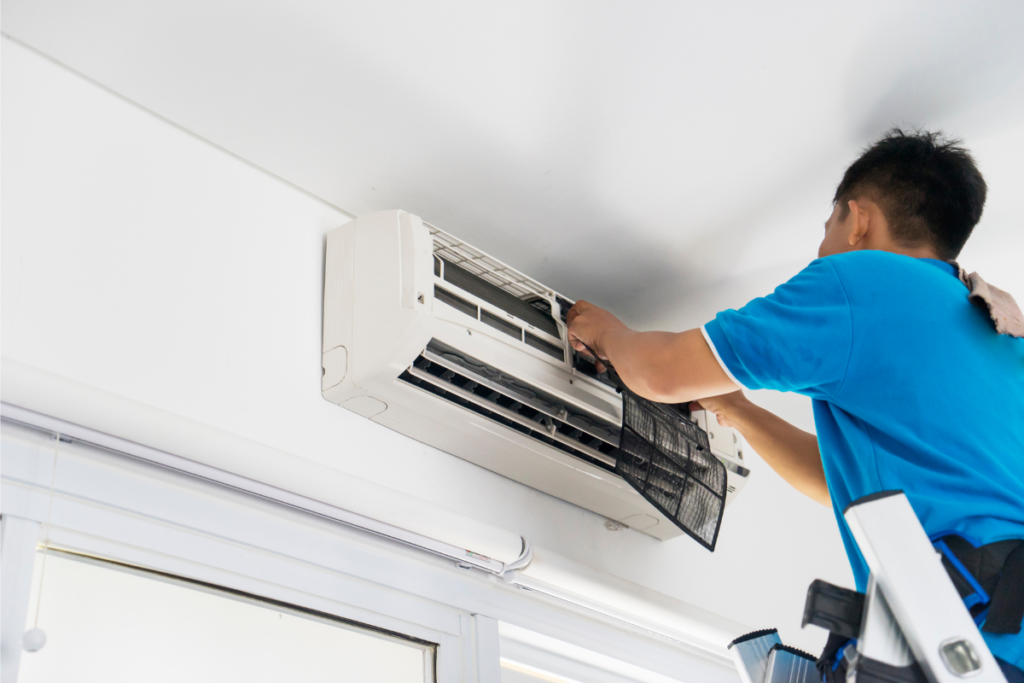With the “Implied Habitability Guarantee” we know that owners in California and other states are not required to provide air conditioning to their rental property. As a rule, if the owner provides air conditioning and/or heating as a comfort in his rental property, he is responsible for repairing it and paying for the associated costs.

Some local regulations require landlords to provide air conditioning but not maintain it, so make sure you and your landlord are clear about who is responsible for heating and air conditioning and to what extent. Most states require homeowners to provide adequate heating, but air conditioning is usually not required. While homeowners in Oregon are not required to provide air conditioners, they are required by law in some states, including parts of Nevada, Arizona and Texas.
The table below outlines what owners must provide under state law for each state when it comes to heating and air conditioning. Living conditions in any state can affect what the owner should do.
Simply put, the implied livability guarantee means that landlords have an obligation to provide a safe and livable environment for their tenants, and tenants have a right to residential property. Owners must provide a general awareness of habitability, which means that the home must be safe, hygienic and secure.
The owner must make all repairs and do whatever is reasonably necessary to bring the rental unit to a fit and habitable condition. Your landlord must provide you with a safe, clean, and livable rental property. Return the house to the landlord in a clean and proper condition. The owner must maintain in reasonably good and safe working order all electrical, gas, plumbing, sanitary, heating, ventilation, air conditioning and other appliances and devices supplied or to be supplied by the owner.
The landlord is also responsible for repairing the heating system if the tenant has not damaged the premises. Tenants can still rent the space, but the landlord is not required to provide them with heating or air conditioning. If your landlord is required by law to provide heating or air conditioning, and one of these systems in your apartment fails, the landlord must fix the problem within a reasonable amount of time.
The landlord must provide plumbing, a reasonable amount of hot water, and heating, unless the building is required by law to be equipped for that purpose, or the rental unit is equipped with appliances that generate heat and hot water and these household appliances is under the exclusive control of the tenant. In addition to the obvious reasons for comfort and cooling, if a rented house or apartment has a working air conditioning system when a tenant moves out, the landlord is obligated to service the air conditioning system.
In Phoenix, Arizona, for example, tenants must notify owners in writing of the need to repair an air conditioner that is part of the rental unit that is part of the air conditioner that is part of the rental unit. If the tenant provides written notice to replace or repair the smoke detector, the landlord must do so within seven business days of notice. In every state (except Arkansas, where landlords are not required to provide any service or repair any item, tenants must notify the landlord if there is an item that needs repair.
Tenants can only complete these steps if they have notified their landlords in advance in writing and have waited five days for repairs and must provide receipts to deduct expenses. However, if the necessary repairs are caused by misuse or negligence by tenants, they are financially responsible for the repairs.
Some communities may have additional rules for tenants and landlords. In addition to state laws, cities can regulate rental practices through municipal ordinances. For example, in Wisconsin, the hiring practices of landlords are governed by a number of administrative laws.
All states have laws and regulations in place to ensure that rental properties are safe and livable, including heating. In all states, landlords are required to provide a “safe and livable environment,” which means that the tenant is provided with safe and structurally sound housing with running water and sanitation and adequate systems to keep them running. . Owners are required to keep the common areas in all rental units clean and in good repair. A typical rental property should have gas, heating, electricity, and functional plumbing such as sinks, toilets, and a working bath or bath and shower combination.
With Tennessee’s sweltering summer heat, you’ll likely want to ensure your air conditioning is working properly to retain and attract quality tenants in the long run, which means you need to maintain a fully functional HVAC system for your rental property. Managing a rental property can be an incredible wealth creation opportunity, but you need to make sure your HVAC systems are working well in order to have happy and comfortable tenants. As a landlord, extending the life of your system by keeping your tenants comfortable should be a priority.
You may be wondering if your landlord can control utilities like heating. These are commonly known as the Landlord’s Habitability Guarantee and are designed to ensure tenants have access to essentials. Tenant rights attorney Jacob Eppler says problem-solving FOX31 laws in Colorado require a healthy living environment to require heating, not air conditioning. Unlike heat and water, most housing departments don’t consider air conditioning a must, said Jim Brooks, director of housing for the National League of Cities.
